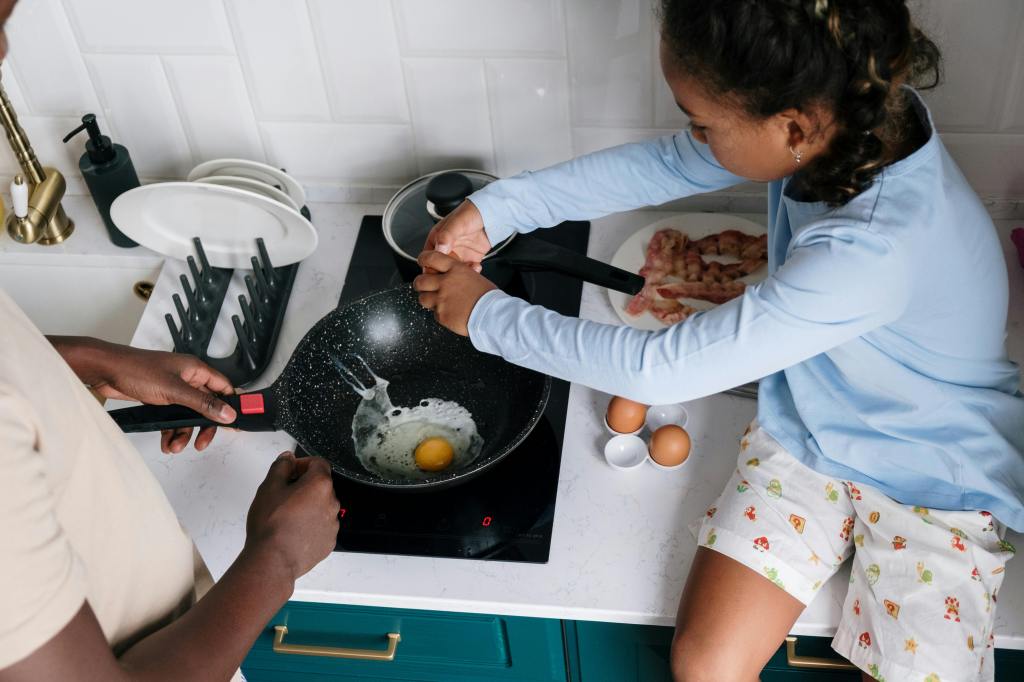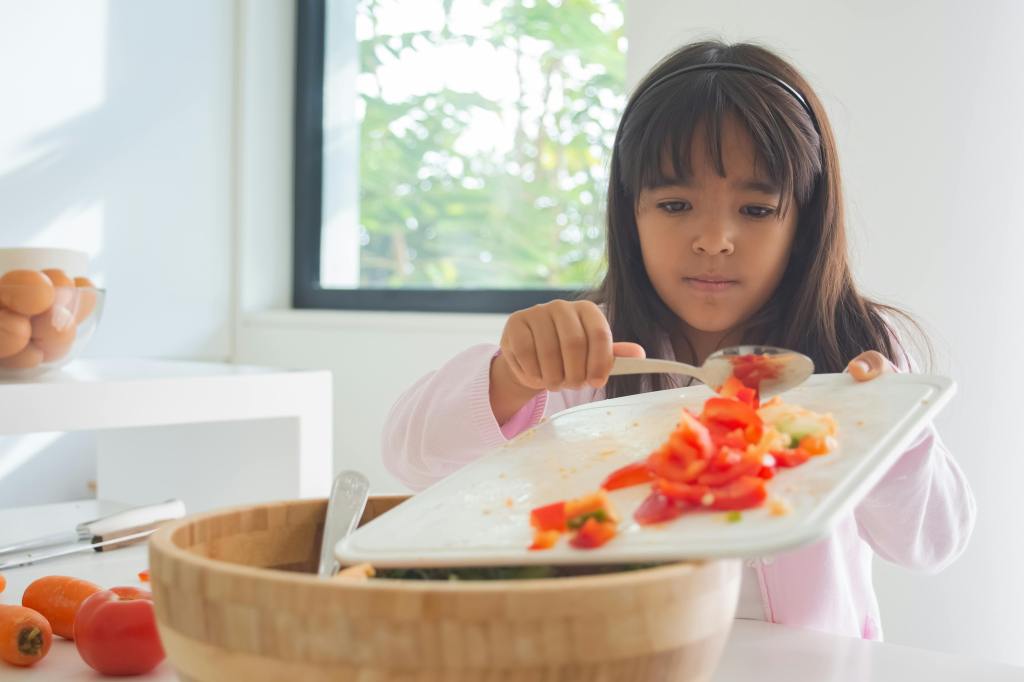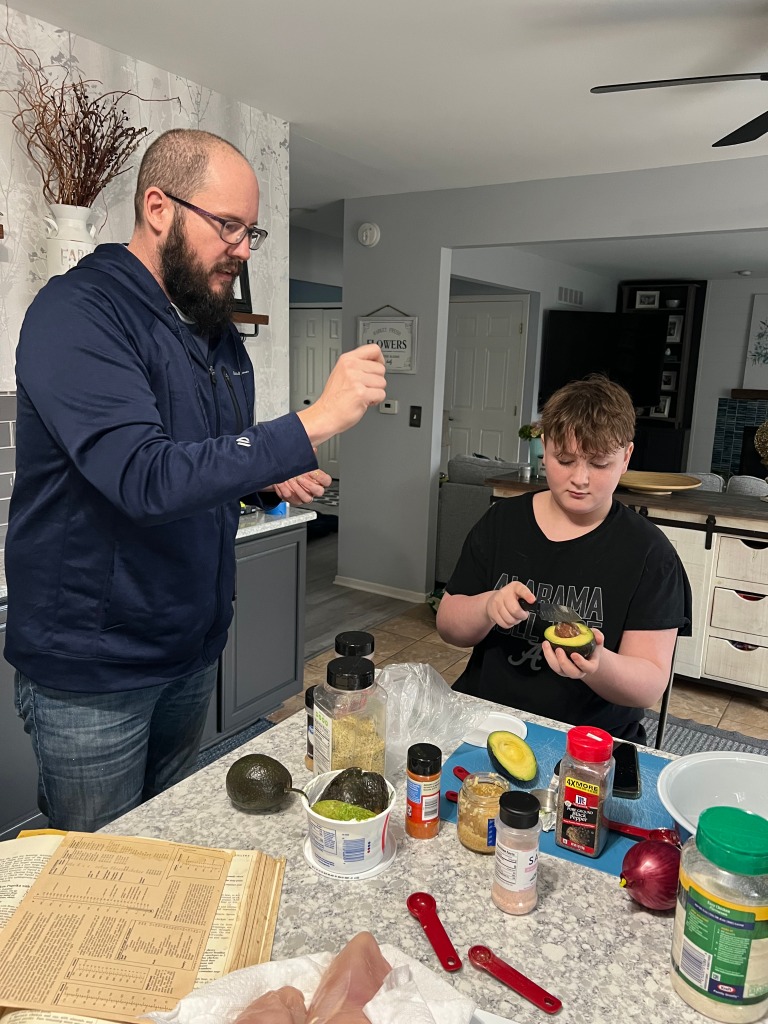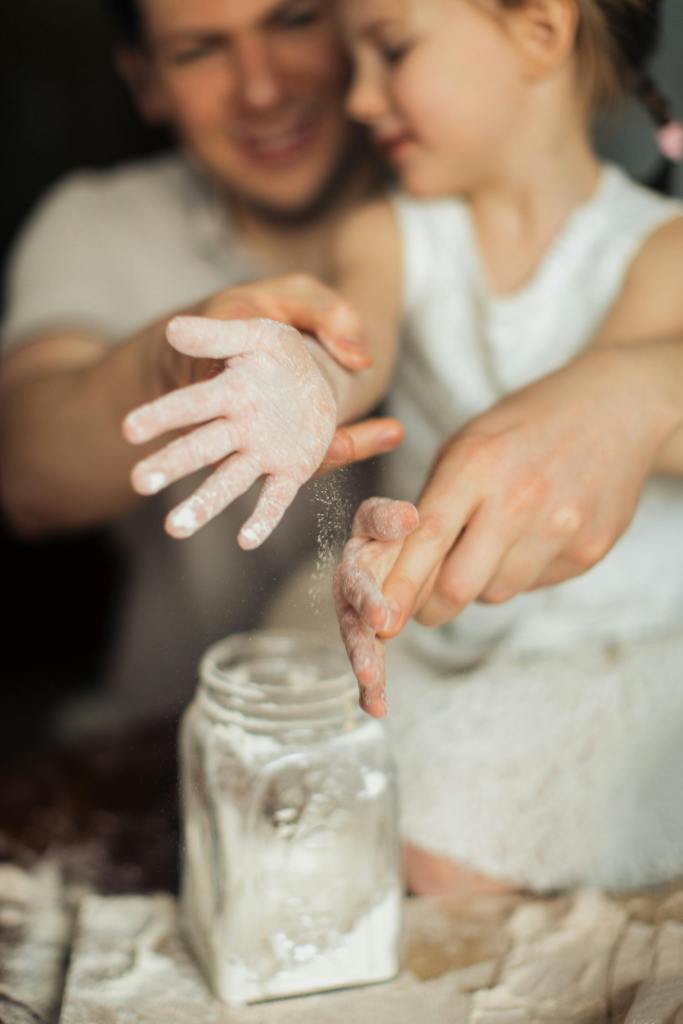Benefits of baking with kids!
As a mother of six kids I can honestly say I’ve spend oodles of hours in the kitchen with all of my children. Most of which were very enjoyable! Over the years my kids have grown into some pretty awesome cooks and bakers.
I currently teach gardening & cooking classes for kids, adults, & seniors at a local parks and recreations department. Which is where todays blog post idea came from. The kids in my classes really enjoy getting involved with the actually cooking and baking. Getting their hands dirty so to speak.
Baking with kids is not only a fun and enjoyable activity, but it also offers numerous benefits for their development. One of the main advantages of baking with kids is that it allows them to enhance their motor skills. From measuring ingredients to mixing and kneading dough, these activities require precision and coordination, which help children improve their hand-eye coordination and fine motor skills.
Another benefit of baking with kids is that it promotes creativity. Baking is like a blank canvas where kids can let their imagination run wild. They can experiment with different flavors, colors, and decorations, fostering their creativity and allowing them to express themselves. Furthermore, baking also encourages problem-solving skills. When faced with a baking challenge or a recipe that doesn’t turn out as expected, kids learn to think critically and find solutions.
You might also be interested in How to Incorporate Kids Into Your Vegetable Garden & Kid Friendly Projects!

Educational benefits of baking with kids
Baking offers a wide range of educational benefits for kids. One of the main educational benefits is that it helps children learn about math and science in a practical and engaging way. When measuring ingredients, kids get hands-on experience with fractions, units of measurement, and proportions. They learn about the importance of precise measurements and how different ingredients interact with each other to create the desired outcome.
Baking also introduces kids to the concept of chemical reactions. They can witness firsthand how ingredients transform when exposed to heat, such as how dough rises or how eggs change their consistency when cooked. This sparks their curiosity and encourages them to ask questions about the science behind baking.

Moreover, baking can also teach kids important life skills, such as following instructions and practicing patience. By following a recipe step by step, kids learn the importance of reading and understanding directions. They also develop patience as they wait for the dough to rise or the cookies to bake, understanding that good things take time and effort.
Here is a our families favorite Chocolate Cookie Recipe

Join the list
Join hundreds of our subscribers and be the first to know about new content and special offers.
Safety tips for baking with kids
While baking with kids is a fantastic activity, it’s important to ensure their safety in the kitchen. Here are some safety tips to keep in mind:
- Supervision: Always supervise kids in the kitchen, especially when dealing with sharp objects or hot surfaces. Make sure they understand the potential dangers and teach them how to handle kitchen tools safely.
- Proper Attire: Have kids wear appropriate clothing, such as an apron to protect their clothes, closed-toe shoes to prevent accidents, and tie back long hair to avoid it getting caught in equipment.
- Hand Washing: Teach kids the importance of washing their hands before and after handling food to prevent the spread of bacteria.
- Heat and Fire Safety: Teach kids about the dangers of hot surfaces, oven mitts, and open flames. Make sure they understand how to safely handle hot pans, use oven mitts, and never touch a hot stove.
- Food Allergies: If baking with kids who have allergies, ensure that all ingredients are safe for them. Read labels carefully and avoid cross-contamination.
By following these safety tips, you can create a safe and enjoyable baking experience for you and your kids.

Essential tools and ingredients for baking with kids
To have a successful baking experience with kids, it’s important to have the right tools and ingredients on hand. Here are some essential items you’ll need:
- Mixing Bowls: Have a variety of mixing bowls in different sizes to accommodate different recipes. Plastic bowls are ideal for young children as they are lightweight and less likely to break.
- Measuring Cups and Spoons: Invest in a set of measuring cups and spoons specifically designed for kids. These usually come in bright colors and have clear markings, making it easier for kids to measure ingredients accurately.
- Whisk and Spatula: A whisk is essential for mixing ingredients thoroughly, while a spatula is useful for scraping the sides of bowls and folding in ingredients gently.
- Baking Pans and Sheets: Depending on the recipes you choose, you’ll need a variety of baking pans and sheets. Cake pans, muffin tins, and cookie sheets are some common options.
- Ingredients: Stock up on basic baking ingredients such as flour, sugar, baking powder, baking soda, eggs, butter, and vanilla extract. Having these essentials on hand will allow you to bake a wide range of recipes with your kids.
By having the right tools and ingredients, you’ll be well-prepared for a successful and enjoyable baking session with your little ones.
Choosing age-appropriate recipes for baking with kids
When baking with kids, it’s important to choose recipes that are suitable for their age and skill level. Here are some factors to consider when selecting age-appropriate recipes
- Complexity: Start with simple recipes that have fewer steps and require minimal kitchen equipment. As kids gain confidence and skills, you can gradually introduce more complex recipes.
- Time: Choose recipes that have shorter baking times, especially for younger children who may have shorter attention spans. Quick and easy recipes such as cookies or muffins are great options.
- Familiarity: Opt for recipes that include ingredients and flavors your kids enjoy. This will make the baking experience more enjoyable and increase their interest in the process.
- Visual Appeal: Select recipes that yield visually appealing results. Kids are more likely to be excited about baking when they see the end product looking delicious and attractive.
Remember, the goal is to make baking a positive and enjoyable experience for kids, so choose recipes that align with their interests and abilities.

Fun and creative baking activities for kids
Baking with kids doesn’t have to be limited to following recipes. There are plenty of fun and creative activities you can incorporate into your baking sessions. Here are some ideas:
- Decorating: Allow kids to unleash their creativity by decorating cookies, cupcakes, or cakes. Provide them with different colored icings, sprinkles, and edible decorations to let their imagination soar.
- Shape and Design: Use cookie cutters in various shapes to create fun and unique treats. Kids can help cut out the shapes and decorate them afterward.
- Theme-based Baking: Choose a specific theme for your baking session, such as holidays, seasons, or favorite characters. This adds an element of excitement and encourages kids to get involved.
- Baking Competitions: Turn baking into a friendly competition by dividing into teams and challenging each other to create the best dessert. This fosters teamwork and adds an extra level of fun.
- Recipe Creation: Let kids create their own recipes by allowing them to choose ingredients and experiment with flavors. This empowers them to be creative and gives them a sense of ownership over their creations.
Incorporating these fun and creative activities into your baking sessions will make the experience more enjoyable and memorable for both you and your kids.
Teaching kids about measuring and following recipes
One of the essential skills kids can learn through baking is the art of measuring and following recipes accurately. Here are some tips to help you teach kids about measurements and recipe following:
- Explain the Importance: Start by explaining why precise measurements are crucial in baking. Show them how different quantities of ingredients can affect the outcome of a recipe.
- Demonstrate Measuring Techniques: Show kids how to properly measure ingredients using measuring cups and spoons. Teach them to level off dry ingredients and measure liquids at eye level.
- Let them Take the Lead: As kids become more confident, allow them to take the lead in measuring ingredients. Supervise and assist when needed, but encourage them to do it themselves.
- Read and Understand the Recipe: Teach kids how to read and understand a recipe before starting. Show them how to identify the ingredients and steps involved, emphasizing the importance of following directions.
- Step-by-Step Guidance: Break down the recipe into manageable steps and guide kids through each one. Explain the purpose of each step and how it contributes to the overall outcome.
By teaching kids about measuring and following recipes, you are not only imparting valuable life skills but also instilling in them a sense of confidence and independence in the kitchen.
Incorporating math and science into baking with kids
Baking provides an excellent opportunity to incorporate math and science concepts into a hands-on learning experience. Here are some ways to incorporate math and science into baking with kids:
- Measurement and Fractions: Baking involves precise measurements, which allows kids to practice their math skills. Ask them to convert measurements, double or halve recipes, or work with fractions when measuring ingredients.
- Temperature and Time: Baking requires understanding temperature and time concepts. Discuss with kids how different temperatures affect the baking process and how they can adjust baking times accordingly.
- Chemical Reactions: Baking involves chemical reactions that transform ingredients into delicious treats. Explain to kids how yeast causes dough to rise or how baking powder reacts with acid to create bubbles in a cake.
- Counting and Sequencing: Baking often involves counting and sequencing steps. Ask kids to count the number of eggs or the number of times they need to mix the batter.
- Problem Solving: Encourage kids to problem-solve when faced with challenges in the kitchen. For example, if a cake sinks, discuss possible reasons and solutions, fostering critical thinking skills.

Incorporating math and science concepts into baking not only makes the learning process more engaging but also helps kids understand the practical applications of these subjects in everyday life.
Baking with kids for special occasions
Baking with kids can be a wonderful way to celebrate special occasions and create lasting memories. Here are some ideas for baking with kids during different occasions:
- Birthdays: Let kids take charge of baking their own birthday cake. Allow them to choose the flavor, decorations, and even help with the frosting.
- Holidays: Bake festive treats for holidays such as Christmas, Halloween, or Easter. Get creative with themed cookies, cupcakes, or cakes, and involve kids in the entire process.
- Family Gatherings: Baking can be a great way to contribute to family gatherings. Have kids prepare a favorite family recipe and share it with their loved ones.
- School Events: If there’s a bake sale or school event, encourage kids to bake goodies to contribute. This not only helps them develop a sense of responsibility but also allows them to contribute to their community.
- Random Acts of Kindness: Bake treats with kids to give to neighbors, friends, or community members as random acts of kindness. This teaches kids the joy of giving and spreading happiness.
By baking with kids on special occasions, you create meaningful experiences and teach them the importance of sharing and celebration.
Creating lifelong memories through baking with kids

Baking with kids is not just about making delicious treats; it’s about creating lifelong memories and valuable learning experiences. From enhancing motor skills to fostering creativity, baking provides numerous benefits for children’s development. It allows them to explore math and science concepts, teaches them important life skills, and instills a sense of confidence and independence in the kitchen.
By following safety tips, having the right tools and ingredients, and choosing age-appropriate recipes, you can create a fun and educational baking experience for your kids. Incorporating fun and creative activities, teaching kids about measurements and following recipes, and integrating math and science concepts further enriches the experience.
Whether baking for special occasions or simply enjoying quality time together, baking with kids creates moments that will be cherished for a lifetime. So grab your aprons, gather the ingredients, and embark on a baking adventure with your little ones. Start mastering the art of baking with kids today and create memories that will last a lifetime.
CTA: Discover more fun and educational activities to enjoy with your kids! Check out our website for exciting ideas and inspiration.
If you enjoyed this blog , please LIKE, Follow, Share & leave me a comment! I love your feedback!
If you aren’t following me on Facebook & Instagram, go on over & give a LIKE & Follow me for daily tips & tricks for your home & garden!
Remember to eat fresh, shop local, & have a happy day,
Jean
Copyright Policy
All text and images on this site are copyright of For Dragonflies And Me. Unless otherwise noted, you may not use this content
This post may contain affiliate links. If you choose to purchase through an affiliate link, I may receive a small commission at no additional cost to you. You can see my full disclaimer here.





Pingback: Baking 101~ Introduction to Baking Like a Pro – For Dragonflies And Me